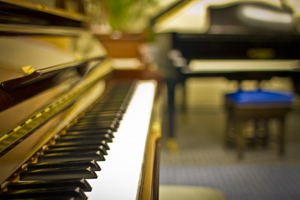What to Expect at your First Piano Lesson

Taking lessons can help you to enjoy playing the piano
If you want your playing technique to flourish and advance at a brisk pace, then piano lessons are the best way to develop your talent. Your teacher will probably have instructed dozens, if not hundreds, of pupils over the years, and will be able to teach you the best way of becoming an accomplished piano player.
Not only will they be able to teach you how to play music, they will also teach you techniques that will enhance your playing, such as sight-reading, playing scales and learning how to add expression as you play.
If you are thinking of beginning piano lessons, you might be asking yourself: ‘What can I expect at my first lesson?’
A gentle introduction
Your piano teacher will not sit you down at the piano and expect you to play ‘Für Elise’ instantly, and the lid of the piano will not be slammed if you fail.
First of all, your chosen teacher will speak to you to assess your experience, your musical knowledge and what you would like to gain from your lessons. Some learners take on piano lessons for pleasure, or because it has always been an ambition; others want to pass music exams, all the way up to grade eight.
Don’t worry if you can barely pick out ‘Happy Birthday’ on the keyboard. Everyone has to start somewhere, and your teacher will understand that.
Your teacher will also want to know if you have access to a piano for practising. If you don’t, they will advise you to speak to a piano retailer about an affordable first piano. Practising is very important as a supplement to your lessons, and you can’t really expect to advance unless you have access to a piano where you can practice in your own time. If noise is a concern, enquire about silent pianos that play like a regular piano but through headphones.
Those first steps
For your first lesson, your teacher will show you how to sit at the piano, how to hold your hands, and how to strike the keys. A piano is a dynamic instrument – this means that the harder you strike the keys, the louder the notes will sound. Dynamics form an important role in piano music, so you will need to learn how to produce both soft and loud notes. You will also learn how to position your hand so that you can reach the keys efficiently.
If you have no idea how music is written down, then your teacher will explain the notes to you, where they appear on a musical score (i.e. their position on the stave), and how they relate to the piano keys themselves. They may then show you how to play a scale (usually C Major) with the correct fingering. Finally, they may give you a simple, one-handed melody to learn.
Your teacher should also recommend a practical method book and a theory book. These will help you while you practice before your next lesson.
Patience is needed
It may take many years before you are able to play the piano to a really good standard. If that is your aim, then you can congratulate yourself that you’re started out on your piano-playing journey with that first step – your first piano lesson.
If you’re looking for a piano teacher, ask Piano Workshop for a recommendation today.

